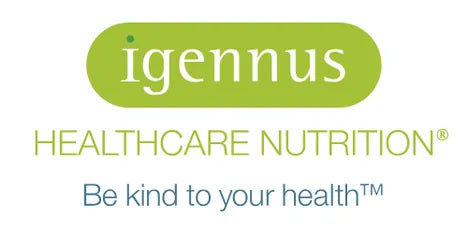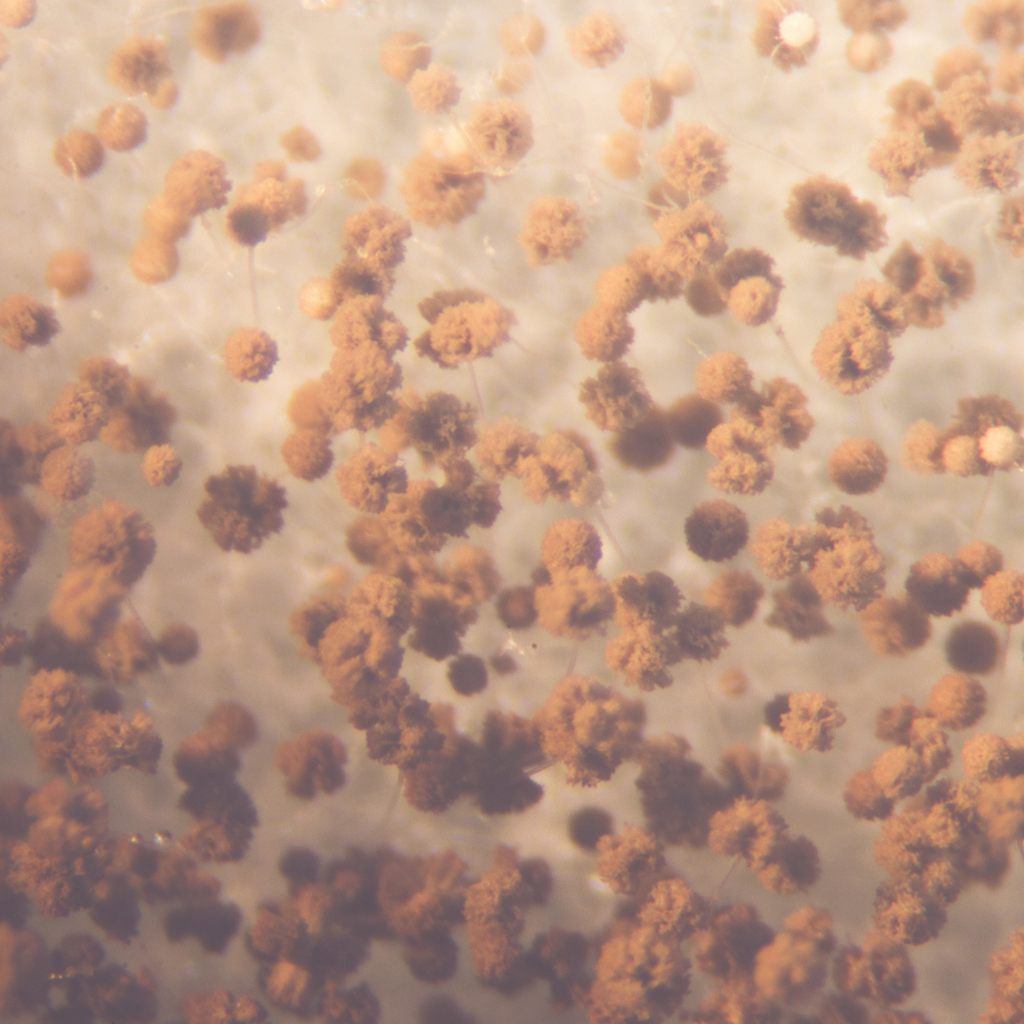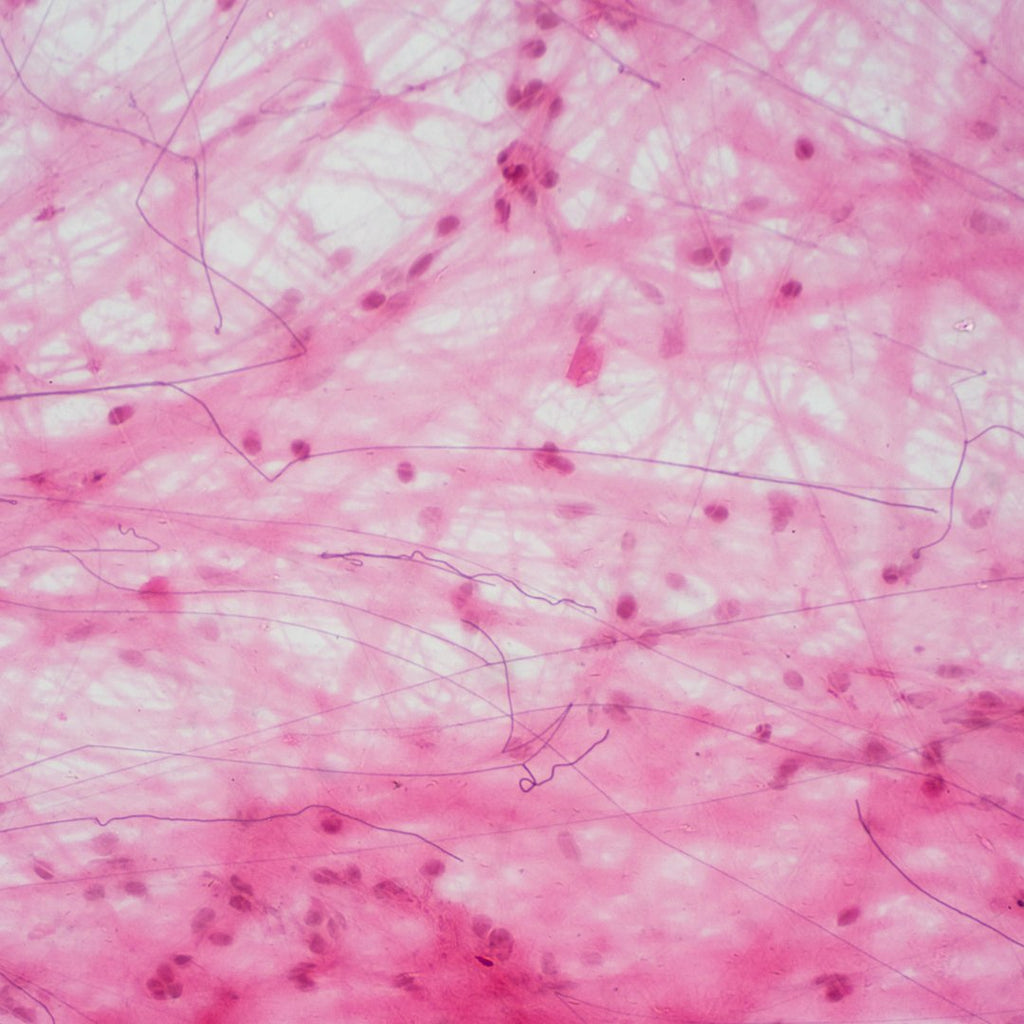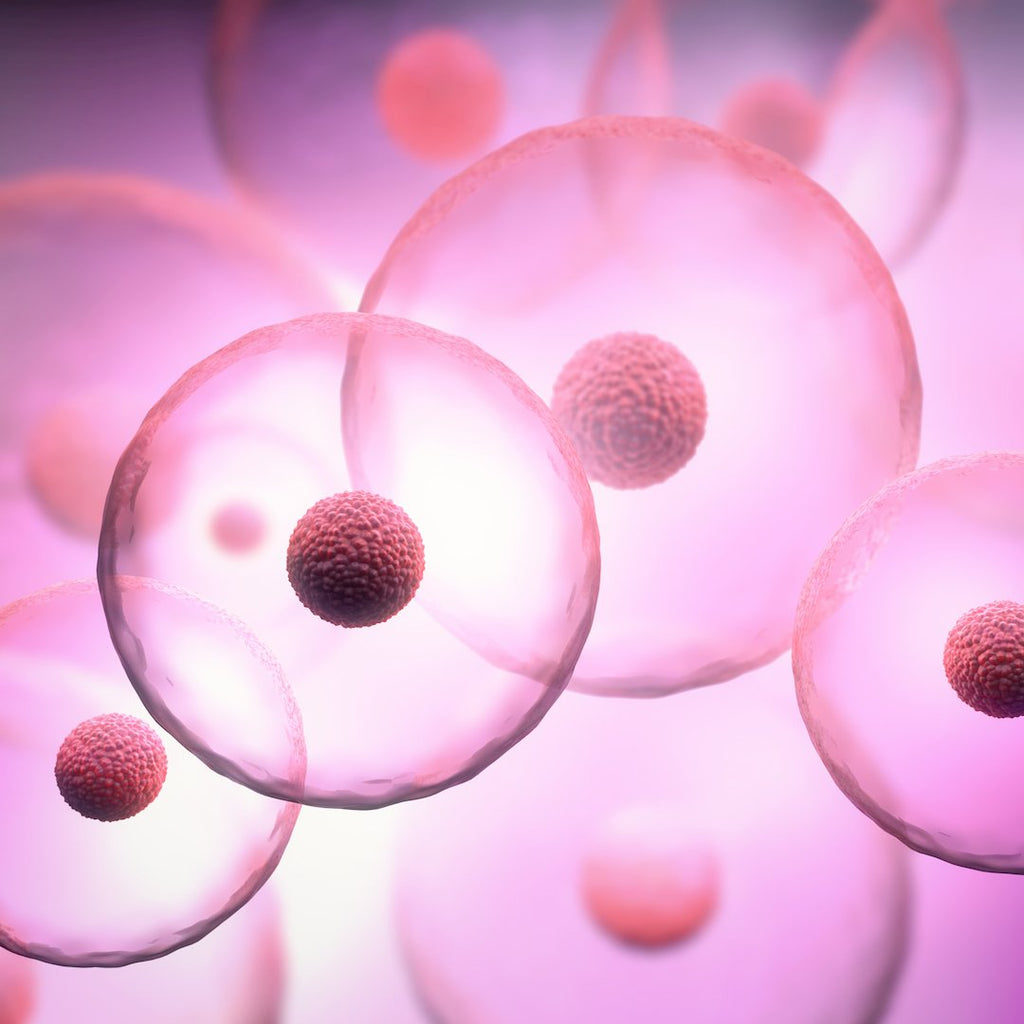One could be forgiven for dismissing collagen as a passing beauty trend, but there is growing credible research evidence supporting numerous benefits from supplementing with a quality collagen product. In this article, we demystify different collagen types, and delve into the numerous health advantages backed by clinical trial evidence. We also introduce both new bovine Advanced Hydrolysed Collagen Peptides and Advanced Vegan Pro-Collagen, formulated by Igennus nutrition scientists to be the closest plant-based alternative to animal- or marine-derived collagen.
Collagen – functions and types
Collagen is the most important and abundant structural protein in the body. Its long, fibrous architecture gives skin, bones, tendons, ligaments, cartilage and joints strength and flexibility; it is also an important component of connective tissue.
28 types of collagen have been identified, with types I, II and III being the most abundant in the human body, making up 80-90% of total collagen. Type I (the most common) has enormous tensile strength and is found in tendons and bone, skin and hair. Type II is found in articular cartilage. Type III is found in skin and extracellular matrix. The ratio between Type I and Type III collagen in the skin decreases with age.
All forms of collagen are made up of sets of 3 amino acids (tripeptides), joined together in triple helix chains. Glycine is always one of the 3 amino acids, with proline and hydroxyproline alternating as the 2nd amino acid. The ‘type’ of collagen is determined by the structural way in which these chains are arranged in tissues. It is therefore questionable if supplementing different ‘types’ of collagen is of particular benefit, as they contain the same basic tripeptides which can be reassembled into any form of collagen once digested and absorbed. Similarly, marine collagen offers no proven physiological benefit over bovine.
The fact that collagen is rich in glycine has its benefits. While not an essential amino acid, the body has a limited capacity to produce glycine, and a deficit must be made up from the diet or supplements. Those eating diets high in animal products (and thus methionine) require more glycine, as glycine is involved in methionine metabolism. Requirements also increase with illnesses that disrupt glycine synthesis, such as rheumatoid arthritis. Collagen contains 25 times as much glycine as methionine.
Health Benefits
Collagen makes up 75% of the ‘dry weight’ of the skin, hence decreased collagen production during ageing causes wrinkles and reduced skin elasticity. Furthermore, ageing affects collagen architecture, leading to rough, less plump skin. Studies show that collagen supplementation noticeably improves skin elasticity, hydration & smoothness and decreases wrinkles. (2, 3) ‘Beauty from within’ is further boosted by collagen’s ability to decrease cellulite (4), and improve the condition of hair and brittle nails. (5)
Musculoskeletal health is another popular reason for supplementation. In those who get non-arthritic exercise-induced joint pain, hydrolysed collagen has been shown to lengthen the period of pain-free activity, improve joint mobility and recovery time, and decrease the need for additional therapies such as physiotherapy and ice packs. (6, 7) Research shows benefits for both osteo- and rheumatoid arthritis. Patients taking collagen daily have less joint pain and an improvement in physical activity. (8, 9)In combination with resistance training, collagen supplementation yields significantly increased muscle mass and strength gains (10, 11) and it is often used at a higher dose of 15g/day for these purposes. Lending structural strength to bones, 5g collagen daily for 1 year has been shown to increase bone mineral density in postmenopausal women. (12) Those struggling with tendon injuries will draw hope from trials proving increased tendon vascularisation and decreased symptoms, leading to faster return to usual physical activity. (13) As ligaments and tendons are poorly vascularised, it is recommended to consume collagen before exercise, with its associated enhanced blood flow. Data suggests there is a dose-related response to key amino acids, with an optimal 20g of protein/collagen hydrolysate taken 30-60 minutes before exercise. (25)
A lesser known benefit of collagen supplementation is its positive effect on metabolism. As diets low in glycine are a risk factor for diabetes (14), collagen supplementation may be protective. Even in those diagnosed with diabetes, research shows better control of blood glucose and an improved cholesterol profile.(15) Reducing stiffness of blood vessels is important for cardiovascular health and normal blood pressure, and collagen is clinically proven to decrease arterial stiffness, thanks to its role in the structure of blood vessel walls. (16)
Those trying to lose weight might consider supplementing before a meal – as collagen, naturally high in protein, brings about a feeling of satiety, decreasing the chance of overeating during a meal and snacking afterwards. (17) Collagen even improves sleep and decreases daytime fatigue after sleep deprivation. (18, 19)
Last, but not least- there’s increasing awareness of the role that gut health plays in so many body systems including immunity, brain health and mood, and the proposed role of gut hyperpermeability in causing a variety of chronic health conditions. The amino acids in collagen peptides and Vegan Pro-Collagen repair and seal the gut, decreasing permeability and protecting against ulcers. (20, 21)
Dietary sources and deficiencies
Our ancestors got plenty of collagen in their diets by utilising the whole animal, eating the connective tissues, tendons, bones and organ meats of animals. However, in modern diets, ‘nose-to-tail’ eating and slow-cooking of collagen-rich cuts and bones is usually shunned in favour of convenient muscle meats which are lower in collagen, while chicken and fish skin are seldom eaten. There are no sources of collagen in vegan and vegetarian diets.
There are several genetic defects of collagen production, the most well known being:
-osteogenesis imperfecta, an autosomal dominant disorder of type 1 collagen. Also known as ‘brittle bone disease’, it causes fractures and other systemic manifestations.
-Ehlers-Danlos syndrome, another inherited collagen disorder, causes joint hypermobility and dislocation, stretchy, fragile skin and heart valve disorders.
Vitamin C deficiency is a nutritional cause of decreased collagen production.
Factors influencing collagen production
Most collagen is secreted by fibroblasts in connective tissue and some is also made by epithelial cells.
Ageing affects collagen in two ways: starting at about age 35, collagen production naturally slows down. By age 40, collagen is broken down more rapidly than it is produced, and by age 60, over half the body’s collagen is depleted. As we age, not only do levels of collagen fall, but the distribution of collagen fibres alters; instead of a smooth even distribution of fibrils, they form large, bundle-like aggregates, sparsely arranged through the dermis.
Other factors affecting collagen levels include genetics, smoking, pollution, excessive sun exposure, and nutritional deficiencies.
Increasing collagen in the diet
Collagen intake can be increased by eating gelatinous cuts of meat - such as oxtail, and bone broth. However, for environmental and health reasons, increasing animal protein intake is not always desired, and making bone broth at home is energy-intensive as it needs to simmer for more than 24 hours. Commercially-available bone broth is expensive, and many clients simply don’t enjoy the taste.
Hydrolysed collagen peptides and Vegan Pro-Collagen vs. gelatine and bone broth
The form of collagen found in bone broth and gelatine is actually quite different from supplements containing hydrolysed peptides, a concentrated source of body-ready collagen building blocks.
Hydrolysed peptides are sourced from collagen extracted from hides or other animal sources, reacted with water and heat to form gelatine, and broken down enzymatically into small protein fragments. These di- and tripeptides are easily absorbed whole, without needing further digestion and can easily be reassembled in the body where they are needed.
Vegan Pro-Collagen contains both amino acids from a whole food source, and added single amino acids proline, hydroxyproline and glycine - body-ready for efficient absorption.
Gelatine, which is basically cooked collagen, has not undergone processing to predigest it, and is less bioavailable as the body only absorbs what is broken down into sufficiently small fragments as it passes through the digestive tract. Gelatine causes liquids to thicken, so unlike hydrolysed collagen peptides it has limited application for adding to drinks or foods for easy supplementation.
Bone broth, which is made by simmering bones and connective tissues in water for long periods, contains gelatine as well as minerals. The collagen from these sources also needs to undergo digestion before being absorbed, and a lot of bone broth would have to be consumed to achieve the same level of peptides as a hydrolysed collagen supplement. (1)
Introducing Igennus Pure & Essential Advanced Hydrolysed Collagen Peptides
You’ve heard about the many benefits of hydrolysed collagen peptides, but what sets Igennus’s Advanced Hydrolysed Collagen Peptides apart?
Agglomeration
Due to a spray-drying production step, advanced agglomerated collagen peptide products have improved solubility, allowing them to dissolve almost instantly compared to non-agglomerated powders which tend to clump in solution. Agglomeration also decreases the traditional bovine collagen taste and odour.
Animal provenance & grass-fed certification
To ensure a bovine collagen supplement’s purity and animal provenance, it’s important to look for a product made from certified grass-fed cattle. The hides Igennus uses originate from cattle raised outdoors on pasture all year round, and from farms with strict animal welfare protocols which have regular 3rd-party inspections. These cattle do not receive hormones, steroids or synthetic drugs.
Purity
As with all Igennus products, our raw materials meet stringent purity standards for heavy metals and contaminants.
Introducing Advanced Vegan Pro-Collagen with Vitamin C
Whether following a plant-based diet or not, some clients would simply prefer not to use bovine collagen. Igennus nutrition scientist, Dr Nina Bailey, has created an exciting and ground-breaking vegan alternative to bovine collagen - Vegan Pro-Collagen with Vitamin C. Whilst no dietary source of collagen is available in a plant-based diet, this supplement provides a proprietary blend of plant-based proteins with boosted key amino acids, mirroring animal collagen in amino acid composition. The added vitamin C further supports collagen production.
Other vegan collagen supplements tend to fall into two categories: a protein powder which includes proline and glycine (not always in significant amounts and usually not containing hydroxyproline), or a ‘collagen booster’ containing only nutrients that indirectly support collagen production. Only Vegan Pro-Collagen includes all three critical building blocks of collagen – hydroxyproline, proline and glycine- in their correct amounts and ratios.
With a full spectrum of amino acids (more than bovine collagen), and 80% protein, Vegan Pro-Collagen is also a convenient way to boost dietary protein. Hydroxyproline is virtually absent in plant-based diets, and limiting amino acids lysine, methionine, isoleucine, threonine and tryptophan are all included, making this a valuable supplement for vegans. Vitamin C is instrumental in collagen production in the human body as it both promotes collagen gene expression and transcription, and is involved in collagen’s structural stability.
How to take collagen
Both of our collagen powders can be mixed into drinks and foods such as smoothies and yoghurt. Bovine collagen instantly disperses with a quick stir and becomes transparent, whereas Vegan Pro-Collagen behaves more like a traditional protein powder. Usually taken in doses of 5-20 grams daily, as little as 2,5g daily of collagen has proven benefits for joints, skin & nails. (5) One scoop of our vegan pro-collagen contains an impressive 11.2g of protein, which will help sustain blood sugar and energy levels when taken with breakfast. It’s important to take collagen regularly to achieve optimal benefits.
Additional ways to stimulate collagen production
Vitamin C , already included in our vegan pro-collagen, is also found in fruits and vegetables such as citrus, kiwi, berries, bell peppers and broccoli.
Zinc is involved in cleaving long collagen chains into smaller pieces for repair and building of new tissues. Rich sources of zinc include meat, shellfish, legumes, nuts and seeds.
Get enough sleep – as collagen is produced at a greater rate during restorative rest, getting one’s ‘beauty sleep’ is not just an old wives’ tale. (22)
Exercise is a potent regulator of collagen production, with increased secretion seen up to 72 hours after exercise. (23)
References
- Alcock RD, Shaw GC and Burke LM. Bone Broth Unlikely to Provide Reliable Concentrations of Collagen Precursors Compared With Supplemental Sources of Collagen Used in Collagen Research. Int J Sport Nutr Exerc Metab. 2019 May 1;29(3):265-272. doi: 10.1123/ijsnem.2018-0139.
- Choi F et al (2019) Oral Collagen Supplementation: A Systematic Review of Dermatological Applications J Drugs Dermatol. 2019 Jan 1;18(1):9-16.
- Proksch E et al. (2014) Oral Intake of Specific Bioactive Collagen Peptides Reduces Skin Wrinkles and Increases Dermal Matrix Synthesis. Skin Pharmacol Physiol 2014;27:113-119. https://doi.org/10.1159/000355523
- Schunck M, Zague V, Oesser S, Proksch E. Dietary Supplementation with Specific Collagen Peptides Has a Body Mass Index-Dependent Beneficial Effect on Cellulite Morphology. J Med Food. 2015;18(12):1340–1348. doi:10.1089/jmf.2015.0022
- Doris Hexsel MD et al (2017).Oral supplementation with specific bioactive collagen peptides improves nail growth and reduces symptoms of brittle nails First published:08 August 2017 https://doi.org/10.1111/jocd.12393
- Clark K et al. (2008) 24-Week study on the use of collagen hydrolysate as a dietary supplement in athletes with activity-related joint pain. https://doi.org/10.1185/030079908X291967 Accepted 29 Feb 2008, Published online: 15 Apr 2008
- Zdzieblik D et al (2017) Improvement of activity-related knee joint discomfort following supplementation of specific collagen peptides Applied Physiology, Nutrition and Metabolism 2017 Jun;42(6):588-595. doi: 10.1139/apnm-2016-0390.
- Benito-Ruizet P et al. (2009) A randomized controlled trial on the efficacy and safety of a food ingredient, collagen hydrolysate, for improving joint comfort, International Journal of Food Sciences and Nutrition, 60:sup2, 99-113, DOI: 10.1080/09637480802498820
- Schauss et al J. Effect of the Novel Low Molecular Weight Hydrolyzed Chicken Sternal Cartilage Extract, BioCell Collagen, on Improving Osteoarthritis-Related Symptoms: A Randomized, Double-Blind, Placebo-Controlled Trial Agric. Food Chem. 2012, 60, 16, 4096-4101
- Zdzieblik D, Oesser S, Baumstark MW, Gollhofer A, König D. Collagen peptide supplementation in combination with resistance training improves body composition and increases muscle strength in elderly sarcopenic men: a randomised controlled trial. Br J Nutr. 2015;114(8):1237–1245. doi:10.1017/S0007114515002810
- Jendricke P, Centner C, Zdzieblik D, Gollhofer A, König D. Specific Collagen Peptides in Combination with Resistance Training Improve Body Composition and Regional Muscle Strength in Premenopausal Women: A Randomized Controlled Trial. Nutrients. 2019;11(4):892. Published 2019 Apr 20. doi:10.3390/nu11040892
- König D, Oesser S, Scharla S, Zdzieblik D, Gollhofer A. Specific Collagen Peptides Improve Bone Mineral Density and Bone Markers in Postmenopausal Women-A Randomized Controlled Study. Nutrients. 2018;10(1):97. Published 2018 Jan 16. doi:10.3390/nu10010097
- Praet SFE, Purdam CR, Welvaert M, et al. Oral Supplementation of Specific Collagen Peptides Combined with Calf-Strengthening Exercises Enhances Function and Reduces Pain in Achilles Tendinopathy Patients. Nutrients. 2019;11(1):76. Published 2019 Jan 2. doi:10.3390/nu11010076
- Wittenbecher C et al. Amino acids, lipid metabolites, and ferritin as potential mediators linking red meat consumption to type 2 diabetes, The American Journal of Clinical Nutrition, Volume 101, Issue 6, June 2015, Pages 1241–1250, https://doi.org/10.3945/ajcn.114.099150
- Zhu C et al (2010)Treatment with marine collagen peptides modulates glucose and lipid metabolism in Chinese patients with type 2 diabetes mellitus Applied Physiology, Nutrition, and Metabolism, 2010, 35:797-804, https://doi.org/10.1139/H10-075
- Tomosugi N, Yamamoto S, Takeuchi M, et al. (2017) Effect of Collagen Tripeptide on Atherosclerosis in Healthy Humans. J Atheroscler Thromb. 2017;24(5):530–538. doi:10.5551/jat.36293
- Rubio IG1, Castro G, Zanini AC, Medeiros-Neto G. Oral ingestion of a hydrolyzed gelatin meal in subjects with normal weight and in obese patients: Postprandial effect on circulating gut peptides, glucose and insulin. Eat Weight Disord. 2008 Mar;13(1):48-53.
- Bannai M1, Kawai N. (2012) New therapeutic strategy for amino acid medicine: glycine improves the quality of sleep. J Pharmacol Sci. 2012;118(2):145-8. Epub 2012 Jan 27
- Bannai M, Kawai N, Ono K, Nakahara K, Murakami N. (2012)The effects of glycine on subjective daytime performance in partially sleep-restricted healthy volunteers. Front Neurol. 2012;3:61. Published 2012 Apr 18. doi:10.3389/fneur.2012.00061
- Tariq M (1997) Studies on the antisecretory, gastric anti-ulcer and cytoprotective properties of glycine. Res Commun Mol Pathol Pharmacol. 1997 Aug;97(2):185-98.
- Chen Q et al. (2017) Collagen peptides ameliorate intestinal epithelial barrier dysfunction in immunostimulatory Caco-2 cell monolayers via enhancing tight junctions. Food Funct. 2017 Mar 22;8(3):1144-1151. doi: 10.1039/c6fo01347c.
- Kahan et al (2010) Can poor sleep affect skin integrity ? Medical Hypotheses
- Volume 75, Issue 6, December 2010, Pages 535-537 https://doi.org/10.1016/j.mehy.2010.07.018
- Alcock RD, Shaw GC, Tee N, Burke LM. (2019)Plasma Amino Acid Concentrations After the Ingestion of Dairy and Collagen Proteins, in Healthy Active Males. Front Nutr. 2019;6:163. Published 2019 Oct 15. doi:10.3389/fnut.2019.00163
- Knight J, Jiang J, Assimos DG, Holmes RP. Hydroxyproline ingestion and urinary oxalate and glycolate excretion. Kidney Int. 2006;70(11):1929-1934. doi:10.1038/sj.ki.5001906
- Alcock RD, Shaw GC, Tee N, Burke LM. (2019)Plasma Amino Acid Concentrations After the Ingestion of Dairy and Collagen Proteins, in Healthy Active Males. Front Nutr. 2019;6:163. Published 2019 Oct 15. doi:10.3389/fnut.2019.00163
- Alcock RD, Shaw GC, Tee N, Burke LM. (2019)Plasma Amino Acid Concentrations After the Ingestion of Dairy and Collagen Proteins, in Healthy Active Males. Front Nutr. 2019;6:163. Published 2019 Oct 15. doi:10.3389/fnut.2019.00163






